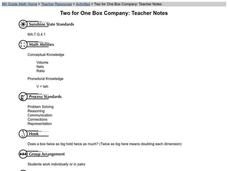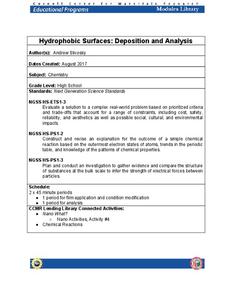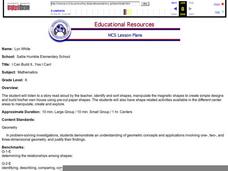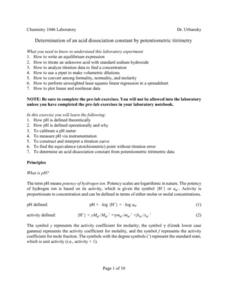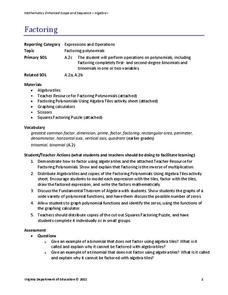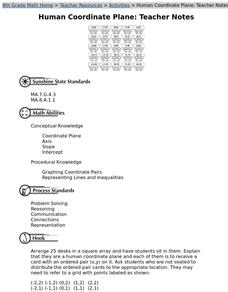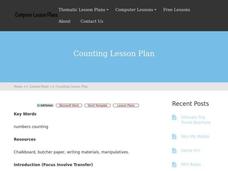Curated OER
Two for One Box Company
Eighth graders experiment to decide if a box that is twice as big holds twice a much. They work the concept of volume and how changing dimensions affect it.
Curated OER
Where has Polly Gone?
Students explore polygons and their uses in careers. They also discover polygons shapes in manmade objects and nature. They use their acquired knowledge to construct a strong structure using polygon shapes.
Curated OER
Everybody Is Unique: A Lesson in Respect for Others' Differences
Learners of all ages talk about the meaning of the word "unique," and draw a truly unique person, one part at a time. They create a totally unique person, with a head drawn by one student, a torso drawn by another student, and lower body...
Cornell University
Hydrophobic Surfaces—Deposition and Analysis
Couches, carpets, and even computer keyboards now advertise they are spill-resistant, but what does that mean? Scholars use physical and chemical methods to coat surfaces with thin films to test their hydrophobic properties. Then they...
Curated OER
Algebraic Expressions
In this algebra worksheet, mathematicians identify important vocabulary related to solving equations. They create and simplify expressions and solve word problems. There are a total of 10 questions that provide a good review of the first...
Curated OER
I Can Build It.....Yes I Can!
Kindergartners listen to a story read by their teacher, then use magnetic shape pieces to construct simple designes. They "build" their own house using pre-cut paper shapes. This age-appropriate lesson would be an excellent choice for...
Digital Forsyth
Parts of a Whole
High school artists create a collaborative piece based on a historical image. Each member of the class is given two days to draw one part of the whole image, when the two days are up; they put their pieces together and discuss the...
Curated OER
Determination of the solubility product of silver(I) chloride
In this chemistry worksheet, students examine the concept of solubility of silver chloride. The sheet has in depth concept and laboratory instructions.
Curated OER
Determination of An Acid Dissociation
In this chemistry worksheet, young scholars examine the given concept in order to apply in the laboratory setting. The sheet includes in depth background information.
Curated OER
What's Next?
Teach the class how to continue a given number pattern, and have them state a rule to explain their answer. Arithmetic sequences and related worksheets are used to reinforce the concept of numerical patterns using the nthterm.
EngageNY
Examples of Functions from Geometry
Connect functions to geometry. In the ninth installment of a 12-part module, young mathematicians create functions by investigating situations in geometry. They look at both area and volume of figures to complete a well-rounded lesson.
It's About Time
How Do Earth's Orbital Variations Affect Climate?
How does Earth's orbit around the Sun affect climate? This third installment of a six-part series looks at how Earth's orbit affects the amount of insolation at locations on Earth involves different experiments used in conjunction...
Curated OER
Heterogeneous Equilibrium: Measurement of a Partition Coefficient
In this chemistry worksheet, students examine a concept in science and then use the knowledge in application by conducting an experiment.
02 x 02 Worksheets
Factoring
Factor in this resource when teaching how to factor polynomials. Scholars use algebra tiles to factor linear and quadratic expressions. They practice their skill by working on example problems from a worksheet.
Curated OER
Colors, Colors Everywhere
Students mix red, yellow, and blue frosting together to produce secondary colors. Pupils are shown that all colors are made from mixing primary colors of paint together. They discuss the color wheel and spread the "paint" icing on...
Curated OER
Human Coordinate Plane
Eighth graders form a human coordinate grid to develop knowledge of the placement and meaning of coordinates on a grid. They experience the placements of the x and y coordinates in an ordered pair.
Curated OER
Graphs
Students graph ordered pairs to model the relationship between numbers. After observing the patterns in ordered pairs, they describe the relationship, and create graphs from a data table. Students describe intervals in the graph, and...
Curated OER
Using Algebra to Solve Puzzles
Students explore basic algebraic operations to solve real life situations. Additional problems are presented to continue the exploration of the concept.
Curated OER
Investigation-Mathematical Reasoning: Tables and Chairs
Fourth graders design a table and chair arrangement. In this mathematical reasoning lesson, 4th graders place tables shaped like equilateral triangles so that they seat the appropriate number of guests.
Curated OER
Tessellation Design And Construction
Students study the basic elements and concepts of the visual art's perceptual component - such as shape, line and color. They create tessellations that foster problem solving and reflective thinking.
Curated OER
Matrix
Young scholars examine characteristics of a matrix. After identifying the determinant of a matrix, students explore the properties of matrix multiplication. They review the properties of matrix multiplication and identify determinants in...
Curated OER
Investigation - Design Your Own Spinner
Seventh graders use ideas of uncertainty to illustrate that mathematics involves more than exactness when dealing with every day situations. The main standard of this instructional activity is statistics and probability.
Curated OER
Counting Lesson Plan
In whole group practice, children count together and identify how many objects are drawn on butcher paper, increasing the number when they have achieved fluency. In pairs, they count manipulatives. They then copy series of numbers from...
Curated OER
Line Symmetry and Rotational Symmetry
Fifth graders investigate the symmetry of pattern block shapes. Students, working in groups determine whether each shape has line symmetry, rotational symmetry or both kinds of symmetry. Students determine how many lines of symmetry the...


